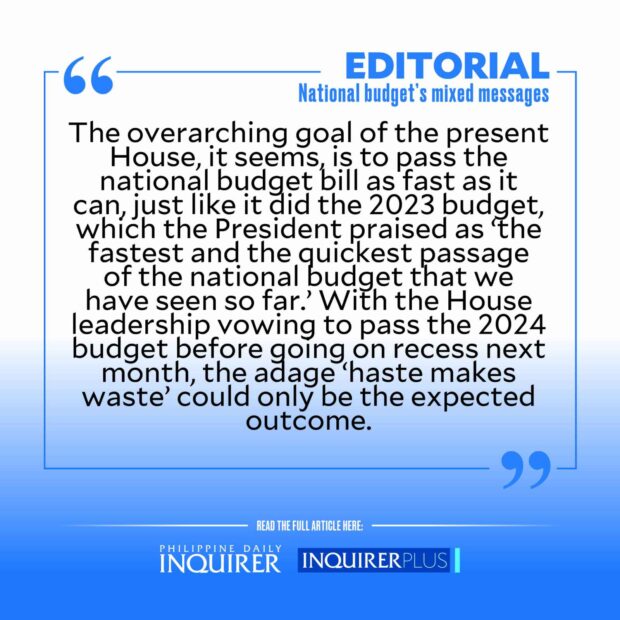National budget’s mixed messages

Among the “structural changes’’ Mr. Marcos mentioned on the way to better health services are the establishment of more specialty centers, widening the coverage of the state’s health insurance, and addressing the shortage of health professionals.
It’s a post-pandemic health agenda that seems to be on the right track—except that its message of inclusion was immediately negated by the lack of resources meant to back it up.
Article continues after this advertisementWhen the P5.768 trillion national budget for 2024 was submitted to Congress earlier this month, the President’s sweet words turned sour. From the current budget of P209.62 billion, Malacañang cut the 2024 Department of Health (DOH) budget to P199.45 billion, House Deputy Speaker Ralph Recto revealed. The biggest casualties of the P10-billion budget cut, Recto noted, were the Lung Center of the Philippines, the Kidney Center of the Philippines, the Heart Center of the Philippines, and the Philippine Children’s Medical Center, whose allocation was reduced by a whopping P818 million. These are the government’s biggest specialty hospitals that cater to poor Filipinos, and which were stretched to near breaking point with the deluge of COVID-19 patients at the height of the pandemic.
Similarly, Recto pointed out that the P32.6 billion budget for the Medical Assistance for Indigents Fund was cut by over P10 billion, and now stands at P22.2 billion. Meanwhile, the P2.9 billion fund for the prevention and control of noncommunicable diseases has been halved to P1.7 billion.
The DOH budget cut is a stark example of mixed messages that the government has been sending: despite its promise of better public health and social services, it saw fit to set aside bigger resources for confidential and intelligence funds, with no provision for transparency or accountability. With P9.2 billion allocated for the confidential and intelligence funds of three offices alone—the Office of the President, the Office of the Vice President (as concurrent education secretary), and the Department of National Defense—the unkindest cut of all on the health sector’s budget puts to question the government’s spending priorities at a time when the public is reeling from the high prices of basic commodities, and could barely afford basic health services.
Article continues after this advertisementEven more disheartening, Recto pointed out, is how the budget for social services suffered because of “big payroll and overhead [expenses] in maintaining a large bureaucracy,” as well as for the “rising debt service.”
For 2024 alone, P699.2 billion was set aside for debt service, accounting for 12 percent of the total budget, and just slightly lower than the P893.3 billion for general public services. The debt service—or money paid for interest and principal of the country’s ballooning debts—is even higher than the individual budget of the top agencies with the biggest allocations: health (P306.1 billion), local government (P259.5 billion), defense (P232.2 billion), transportation (P214.3 billion), social welfare (P209.9 billion), agriculture (P181.4 billion) and labor (P40.5 billion). Only the education department (P924.7 billion), and public works (P822.2 billion) have bigger budgets.
More money for debt payments means less funds for public services.
This brings us to the issue of who holds the power to disburse taxpayer money to ensure that they are spent to benefit the greater number. As it is, there is very little scrutiny by Congress on the national expenditure program drawn up by Malacañang and the Department of Budget and Management. Try as they might, the very few voices in Congress who raise questions on the government’s spending priorities are regularly drowned out by their Palace-allied colleagues and the overwhelming majority in the House, the body tasked with the so-called power of the purse. And whatever corrections or realignments the Senate is able to muster are easily undone during the bicameral conference committee of the two houses, dubbed the third chamber for its absolute power to hammer out the final budget bill.
Such is the sad reality in our system of government, whose three branches are supposed to exercise checks and balances on each other. With the President having the power to decide budget allocations, this constitutional mandate is rendered useless.
The overarching goal of the present House, it seems, is to pass the national budget bill as fast as it can, just like it did the 2023 budget, which the President praised as “the fastest and the quickest passage of the national budget that we have seen so far.”
With the House leadership vowing to pass the 2024 budget before going on recess next month, the adage “haste makes waste” could only be the expected outcome.
















